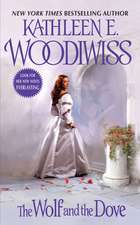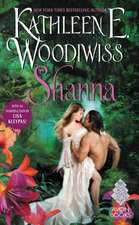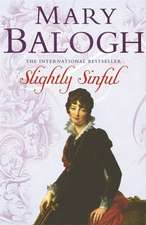The Smoke Thief
Autor Shana Abeen Limba Engleză Paperback – 31 aug 2006
Dubbed the Smoke Thief, a daring jewel thief is confounding the London police. His wealthy victims claim the master burglar can walk through walls and vanish into thin air. But Christoff, the charismatic Marquess of Langford, knows the truth: the thief is no ordinary human but a “runner” who’s fled Darkfrith without permission. As Alpha leader of the dra´kon, it’s Kit’s duty to capture the fugitive before the secrets of the tribe are revealed to mortals. But not even Kit suspects that the Smoke Thief could be a woman.
Clarissa Rue Hawthorne knew her dangerous exploits would attract the attention of the dra´kon. But she didn’t expect Christoff himself to come to London, dangling the tribe’s most valuable jewel–the Langford Diamond–as bait. For as long as she could remember, Rue had lived the life of a halfling–half dra´kon, half mortal–and an outcast in both worlds. She’d always loved the handsome and willful Kit from the only place it was safe: from afar. But now she was no longer the shy, timid girl she’d once been. She was the first woman capable of making the Turn in four generations. So why did she still feel the same dizzying sense of vulnerability whenever he was near?
From the moment he saw her, Kit knew that the alluring and powerful beauty was every bit his Alpha equal and destined to be his bride. And by the harsh laws of the dra´kon, Rue knew that she was the property of the marquess. But they will risk banishment and worse for a chance at something greater. For now Rue is his prisoner, the diamond has disappeared, and she’s made the kind of dangerous proposition a man like Kit cannot resist....In this bewitching novel, Shana Abé transports us into a world of exhilarating romance and magic.
From the Hardcover edition.
Preț: 57.57 lei
Nou
Puncte Express: 86
Preț estimativ în valută:
11.02€ • 11.46$ • 9.10£
11.02€ • 11.46$ • 9.10£
Carte disponibilă
Livrare economică 24 martie-07 aprilie
Preluare comenzi: 021 569.72.76
Specificații
ISBN-13: 9780553588040
ISBN-10: 0553588044
Pagini: 324
Dimensiuni: 109 x 173 x 25 mm
Greutate: 0.17 kg
Editura: Bantam Books
ISBN-10: 0553588044
Pagini: 324
Dimensiuni: 109 x 173 x 25 mm
Greutate: 0.17 kg
Editura: Bantam Books
Notă biografică
Shana Abé is the award-winning author of nine novels, including The Smoke Thief. She lives in the Denver area with four surly pet house rabbits, all rescued, and a big goofy dog. Please, please support your local animal shelter, and spay or neuter your pets.
Extras
Chapter One
Chasen Manor
Darkfrith, England
1737
The Right Honourable Christoff Rene Ellery Langford, Earl of Chasen, was bored.
He had decided to demonstrate this fact by slouching in his chair, his legs outstretched and his blond head turned idly away from everyone else in his father's study. One sun-darkened cheek was propped languidly upon his fist; his green eyes were hooded, masked with brown lashes. He listened to his father talk with the haughty, brooding air common to either the young or the powerful.
Kit, as it happened, was both. Sixteen years old and well-acknowledged as the heir to the tribe, he endured these meetings as his duty. He did not speak. He did not bother to meet the eyes of the other men present. When he looked up from his boots he chose to contemplate the view from the Tudor windows, the summer lush hills and rich black trees. The beckoning woods.
He listened to the same debate the council had at every meeting now. He could practically predict, verbatim, who would say what.
"The safety of the tribe is paramount. We must ensure our survival."
Parrish Grady again. The man never let up. Eldest member of the council, blue-eyed, sharp-toothed. Kit was beginning to consider him his own personal nemesis, if for no other reason than these meetings crawled on hours longer than they would without him.
Outside, just over a distant hill, appeared a flock of girls. About Kit's age, white skirts, frilled aprons, straw hats with ties that dangled in the wind. A few carried armfuls of flowers. He watched them come closer.
"Naturally, Parrish, our survival is paramount." Kit's father, the marquess. "No one debates that."
"We need a full-blood female!"
"I'd say we've been doin' our best there," retorted Rufus Booke, brash and newly wed, "though mayhap you'd prefer to check our beds every night."
Kit snorted back a laugh. He felt his father's gaze flick to him, then away.
"Aye, we need a female," the Marquess of Langford agreed. "But we do not appear to have one. Yet. There are several young tribeswomen on the verge of the rebirth. We may hope one of them will complete the Turn."
"Hope," repeated Grady, derisive. "Four generations it's been, and no female to make the Turn! What will happen to us--all of us--when it becomes impossible for the menfolk as well?"
Silence greeted this. It was the great, simmering fear among the tribe, that the Gifts would be taken. That their powers would fade.
"We cannot force our fate," said the marquess, harder now. "We all understand that. We are what we are. Our more immediate concern is the perimeter of the forest. There have been signs of recent disturbance, not our own. Strangers are prowling our lands. Christoff reported horse tracks up to Hawkshead Point."
"Hawkshead? But that's not even ours! What the devil is the boy doing all the way out there? We have rules! He left the boundary!"
Again, the distinctive prickle of his father's gaze. Kit allowed himself the slightest curl of his lips.
"Let us focus on the matter at hand," said the marquess smoothly. "Hawkshead is adjacent to our boundaries. If someone has chanced that far . . ."
The girls had paused in a soft valley between the hills, clutching their hats as the breeze turned brisker. Sunlight showed honeyed locks flying and flaxen, strawberry blond and ginger red. Four girls, smiling and chattering amid the green. Someone loosed her flowers, and the August wind blew them into bright confusion.
Parrish Grady thumped a fist on the arm of his chair. "The boy's too wild, even for our kind. He needs to be reined in. You know it yourself, my lord."
Kit stared a little harder at the girls, his eyes narrowed.
"Thank you, Mr. Grady, but I take the responsibility of raising my son as my own."
"If he is to be Alpha--"
"There is no if," hissed the marquess, coming to his feet. "You will do well to understand that right now."
Silence fell once more across the study. One of the men cleared his throat, nervous, but said nothing.
Outside, the flower girls had gone very still. The strawberry blonde turned her face into the breeze--and the other three did the same. Kit recognized them now, Fanny and Suzanne, daughters of the smith, Liza from the mill. And Melanie, their leader. Melanie, of the apple cheeks and soft petal lips. Melanie, with her quick, cunning smile. He stirred in his chair, leaning casually on his elbow to see what they did.
Sky, grass, woods . . . and a shape in the trees. Another girl.
"There is the matter of the runners," volunteered a new voice, George Winston.
"Aye, the runners," began the murmurs across the room, and the marquess sat down again.
The woodsgirl realized that she had been discovered. She stood frozen as well, smaller than the other four, pressed up against the trunk of a tree. Kit could make out one pale hand against the bark, fingers splayed. He could not see her face.
Very, very slowly, she began to ease backward.
Melanie had turned to the others. She was speaking. She was taking off her hat.
". . . precisely as I said. We cannot risk further incidents with outsiders. We were fortunate enough to capture the Williams boy before he had gotten too far, but the next time may be the time that he--or some other hotheaded young fool--manages to evade us. I shudder to think of what might have happened had he made it past the shire. I need to have a word with his parents again. And then the gamekeepers, I think . . ."
The woodsgirl had managed hardly a step. Perhaps she hoped the others were bluffing; Kit, however, knew Melanie better than that. With infinite care the girl slid back another step, and then Kit caught her profile. It was that lass, the scrawny one always ducking from crowds, peering out of shadows . . . what was her name? He frowned, trying in his mind to place her amid the intricate shoots and branches of the tribe families. He'd seen her mostly around the village, brown-haired, white-skinned. Timid. Mousy, even, if such a word could be applied to any member of their kin.
Melanie's group began to walk toward her and the woodsmouse froze again--then lost her nerve. She skipped back. It was all Melanie needed.
The four girls broke into a sprint.
Kit straightened in his chair, forgetting his father's meeting. Four against one was hardly sporting, especially as the prey was so much younger than the hunters. The mouse vanished from view, swiftly followed by the others. He had glimpses of gowns flashing through the trees, and then nothing.
Calm settled back upon the forest, unbroken, silent as winter snow.
Kit uncrossed his ankles, considering. He'd seen the little mouse more and more of late, now that he thought about it. Always quiet, always alone.
If she had any sense, she'd head for the river. They might lose her scent there--
"Christoff? Christoff! Are you listening, boy?"
"Aye," Kit answered, with just that trace of surliness guaranteed to send color into his father's cheeks. "The perimeter, the runners. Dire peril to the tribe, et cetera."
"How gratifying to have your attention." The marquess thinned his lips. "Perhaps, then, you might have a suggestion for the council?"
For the first time Kit looked around at the gathered faces fixed upon him, tanned and pale and avid eyes.
"Regarding the matter of your bride?" prompted his father softly.
Kit opened his mouth to speak. But just then the woods erupted; the young girl hurtled out of the trees in a flap of skirts and mad streaming hair, her face flushed, cutting a sharp angle across the perfectly manicured rear lawn.
Kit stood, and all the men turned.
"What the--oh--it's--"
"The Hawthorne gel," said George. "Halfling. Clara, Clareta--"
"Clarissa," supplied Kit, in a spark of memory. "And Mel," he added dryly, as the other four emerged at her heels, gaining.
"Ah." The marquess took his seat again with his back to the window. "Halfling. Well, then, no matter. Gentlemen, shall we continue?"
But Kit remained standing, watching the lass run.
She crept into the cottage kitchen on her toes but, as usual, wasn't furtive enough to fool her mother.
"Clarissa? Is that you?"
"Yes, Mama."
She ought to have known she couldn't slip in and hide; her mother's senses were far too keen for that. Or perhaps it was the draft from the back door that gave her away. Either way, she thought glumly, she was caught now.
"What are you doing, child?"
"Washing up."
She dipped her hands into the chipped basin on the counter, scrubbing, watching the water turn pink with blood. She found the dishcloth and ran it over her face, wiping off the dirt, more blood.
"Mama, would you like tea?" she called.
"Yes, dear. That would be lovely."
She set the kettle to boil and scooped the tea leaves from this morning's breakfast, still damp, back into the teapot. She tossed the wash water out over the back steps--sending a quick, nervous look around the garden first--and then refilled it from the cistern.
The kettle began to steam.
By the pot of geraniums on the windowsill was the polished tin oval she had given her mother last Christmas, hung up by a yellow ribbon. It showed the kitchen in dusky gray and always made her face into a long, funny shape that reminded her of a fish, but it was still a better mirror than the windowpanes.
Clarissa examined her reflection critically: her hair was snarled, the white tucker at her collar torn. There was dirt on her elbows and three drops of blood across her bodice. Her lower lip throbbed red and bruised.
"Clarissa, I believe the water's ready."
"Yes, Mama."
No time to change gowns. She brushed herself off as best she could, recaptured her hair and twisted it into a haphazard bun. She poured the hot water into the teapot, set it on the tray along with cups and honey and cream, and then bread with the last of the butter.
One final look into the tin oval. Better, but not best. She widened her eyes to round perfect innocence and practiced a smile--wincing at her lip--then picked up the tray and carried it to her mother's room.
Antonia Hawthorne was sitting up in bed, her ashen hair in plaits, her hands folded on her lap. It was one of her better days; Clarissa could hardly hear her breathing. Her face was drawn but her eyes ever bright as she surveyed her daughter. Her mouth took on a ruthful slant.
"Oh, dear."
With great care, Clarissa set the tray upon the bedside table, unable suddenly to look up from the butter pats.
"Tell me," her mother invited in her soft, gentle voice. She waited as Clarissa fumbled with the spoons, her face still downturned, then said more firmly, "Clarissa Rue."
"An accident. I tripped over a tree root."
"Did you?"
Clarissa tried her wide-eyed look upon the teapot, beginning to pour. "Yes. I was clumsy. I tripped, and then I rolled down a hill. You know that one just past Blackstone Fell. It's very steep."
"Yes. I know it is."
Clarissa handed her the cup, meeting her gaze. "And that's what happened."
Antonia took a sip of tea. "Was Miss Melanie there?"
"No."
"Nor the others?"
"No." Clarissa began to meticulously butter the bread.
"You must stay away from them. I've told you before. They will not be kind to you."
The bread in her hand began a watery waver; she squeezed her eyes closed and felt a tear slink down the side of her nose.
"It is not your fault," said Antonia.
Another tear fell.
"It is mine," finished her mother, still soft.
Clarissa dropped the bread to the tray, swiping at her eyes with greasy fingers.
"Come here, my sweet girl," said Antonia, and Clarissa sniffed and crawled over the covers, slippers and dirty gown and all, nestling into her mother's embrace.
She smelled of medicine and lilacs. Her heartbeat was a fluttering thrum against Clarissa's ear.
She felt her mother's hand lift, begin to work loose the unkempt knot she had made of her hair. Clarissa turned her head and spoke down into the pillows; her voice came out as a miserable whisper.
"Won't they ever like me, Mama?"
"No, beloved. They won't."
"But I try to be like them--"
"You are more beautiful, more wonderful than all those savage girls put together. You are the most precious gift of my life. I am so proud of you, and your father would have been too. But . . ." Antonia's fingers paused; she seemed to be searching for words. "When the tribe looks at you--all they see is him. And he was not one of us."
"One of you, you mean," Clarissa muttered.
"One of us. Half your blood is my blood, the tribe's blood. That is your heritage. No one can deny you it."
The ruffles of her mother's gown were thin and worn, crumpled beneath her cheek. She wiped away another tear.
"Keep alone if you must, keep apart," murmured Antonia, stroking her daughter's dark hair. "Someday you'll grow up to be a splendid young woman, and you'll find a man who will love you for exactly who you are, just as I did. But know, my darling, that no matter what the future brings, you will always have a place here, with the tribe."
She knew whom she wanted to love her. She knew whom she wanted to rescue her, to speak her name and laugh with her and defend her from the world with the sudden, blinding charm of his smile.
Christoff. Golden, lovely Christoff, with his eloquent hands and sleepy green eyes that seemed to fill her soul whenever he chanced to see her. Which wasn't often, she had to admit. There wasn't a boy in the shire to compare to him. That's what Clarissa thought. And that's what Melanie and Liza and all the rest thought too. Clarissa knew, because even though she was only twelve and she hadn't the full blood of the tribe in her veins, she did have one single, clever skill: stealth.
She was very good at it. Or, rather, she had been. Till this afternoon.
She lay awake in her bed and counted the stars through her window, watching Cepheus and Cassiopeia tilt across the heavens. She loved the night best. It was the time for dreaming, for imagining what might be. Tonight the nightingale was singing from her nest in the garden laurel, aching, wistful notes that looped long and then warbled fleet, like water over a streambed. The gingham drape of her curtains framed the treetops that were the eastern end of the orchard. The cottage had been built by her grandfather beside the oldest and largest of the Roman apple trees. Every spring, the air smelled like paradise.
Chasen Manor
Darkfrith, England
1737
The Right Honourable Christoff Rene Ellery Langford, Earl of Chasen, was bored.
He had decided to demonstrate this fact by slouching in his chair, his legs outstretched and his blond head turned idly away from everyone else in his father's study. One sun-darkened cheek was propped languidly upon his fist; his green eyes were hooded, masked with brown lashes. He listened to his father talk with the haughty, brooding air common to either the young or the powerful.
Kit, as it happened, was both. Sixteen years old and well-acknowledged as the heir to the tribe, he endured these meetings as his duty. He did not speak. He did not bother to meet the eyes of the other men present. When he looked up from his boots he chose to contemplate the view from the Tudor windows, the summer lush hills and rich black trees. The beckoning woods.
He listened to the same debate the council had at every meeting now. He could practically predict, verbatim, who would say what.
"The safety of the tribe is paramount. We must ensure our survival."
Parrish Grady again. The man never let up. Eldest member of the council, blue-eyed, sharp-toothed. Kit was beginning to consider him his own personal nemesis, if for no other reason than these meetings crawled on hours longer than they would without him.
Outside, just over a distant hill, appeared a flock of girls. About Kit's age, white skirts, frilled aprons, straw hats with ties that dangled in the wind. A few carried armfuls of flowers. He watched them come closer.
"Naturally, Parrish, our survival is paramount." Kit's father, the marquess. "No one debates that."
"We need a full-blood female!"
"I'd say we've been doin' our best there," retorted Rufus Booke, brash and newly wed, "though mayhap you'd prefer to check our beds every night."
Kit snorted back a laugh. He felt his father's gaze flick to him, then away.
"Aye, we need a female," the Marquess of Langford agreed. "But we do not appear to have one. Yet. There are several young tribeswomen on the verge of the rebirth. We may hope one of them will complete the Turn."
"Hope," repeated Grady, derisive. "Four generations it's been, and no female to make the Turn! What will happen to us--all of us--when it becomes impossible for the menfolk as well?"
Silence greeted this. It was the great, simmering fear among the tribe, that the Gifts would be taken. That their powers would fade.
"We cannot force our fate," said the marquess, harder now. "We all understand that. We are what we are. Our more immediate concern is the perimeter of the forest. There have been signs of recent disturbance, not our own. Strangers are prowling our lands. Christoff reported horse tracks up to Hawkshead Point."
"Hawkshead? But that's not even ours! What the devil is the boy doing all the way out there? We have rules! He left the boundary!"
Again, the distinctive prickle of his father's gaze. Kit allowed himself the slightest curl of his lips.
"Let us focus on the matter at hand," said the marquess smoothly. "Hawkshead is adjacent to our boundaries. If someone has chanced that far . . ."
The girls had paused in a soft valley between the hills, clutching their hats as the breeze turned brisker. Sunlight showed honeyed locks flying and flaxen, strawberry blond and ginger red. Four girls, smiling and chattering amid the green. Someone loosed her flowers, and the August wind blew them into bright confusion.
Parrish Grady thumped a fist on the arm of his chair. "The boy's too wild, even for our kind. He needs to be reined in. You know it yourself, my lord."
Kit stared a little harder at the girls, his eyes narrowed.
"Thank you, Mr. Grady, but I take the responsibility of raising my son as my own."
"If he is to be Alpha--"
"There is no if," hissed the marquess, coming to his feet. "You will do well to understand that right now."
Silence fell once more across the study. One of the men cleared his throat, nervous, but said nothing.
Outside, the flower girls had gone very still. The strawberry blonde turned her face into the breeze--and the other three did the same. Kit recognized them now, Fanny and Suzanne, daughters of the smith, Liza from the mill. And Melanie, their leader. Melanie, of the apple cheeks and soft petal lips. Melanie, with her quick, cunning smile. He stirred in his chair, leaning casually on his elbow to see what they did.
Sky, grass, woods . . . and a shape in the trees. Another girl.
"There is the matter of the runners," volunteered a new voice, George Winston.
"Aye, the runners," began the murmurs across the room, and the marquess sat down again.
The woodsgirl realized that she had been discovered. She stood frozen as well, smaller than the other four, pressed up against the trunk of a tree. Kit could make out one pale hand against the bark, fingers splayed. He could not see her face.
Very, very slowly, she began to ease backward.
Melanie had turned to the others. She was speaking. She was taking off her hat.
". . . precisely as I said. We cannot risk further incidents with outsiders. We were fortunate enough to capture the Williams boy before he had gotten too far, but the next time may be the time that he--or some other hotheaded young fool--manages to evade us. I shudder to think of what might have happened had he made it past the shire. I need to have a word with his parents again. And then the gamekeepers, I think . . ."
The woodsgirl had managed hardly a step. Perhaps she hoped the others were bluffing; Kit, however, knew Melanie better than that. With infinite care the girl slid back another step, and then Kit caught her profile. It was that lass, the scrawny one always ducking from crowds, peering out of shadows . . . what was her name? He frowned, trying in his mind to place her amid the intricate shoots and branches of the tribe families. He'd seen her mostly around the village, brown-haired, white-skinned. Timid. Mousy, even, if such a word could be applied to any member of their kin.
Melanie's group began to walk toward her and the woodsmouse froze again--then lost her nerve. She skipped back. It was all Melanie needed.
The four girls broke into a sprint.
Kit straightened in his chair, forgetting his father's meeting. Four against one was hardly sporting, especially as the prey was so much younger than the hunters. The mouse vanished from view, swiftly followed by the others. He had glimpses of gowns flashing through the trees, and then nothing.
Calm settled back upon the forest, unbroken, silent as winter snow.
Kit uncrossed his ankles, considering. He'd seen the little mouse more and more of late, now that he thought about it. Always quiet, always alone.
If she had any sense, she'd head for the river. They might lose her scent there--
"Christoff? Christoff! Are you listening, boy?"
"Aye," Kit answered, with just that trace of surliness guaranteed to send color into his father's cheeks. "The perimeter, the runners. Dire peril to the tribe, et cetera."
"How gratifying to have your attention." The marquess thinned his lips. "Perhaps, then, you might have a suggestion for the council?"
For the first time Kit looked around at the gathered faces fixed upon him, tanned and pale and avid eyes.
"Regarding the matter of your bride?" prompted his father softly.
Kit opened his mouth to speak. But just then the woods erupted; the young girl hurtled out of the trees in a flap of skirts and mad streaming hair, her face flushed, cutting a sharp angle across the perfectly manicured rear lawn.
Kit stood, and all the men turned.
"What the--oh--it's--"
"The Hawthorne gel," said George. "Halfling. Clara, Clareta--"
"Clarissa," supplied Kit, in a spark of memory. "And Mel," he added dryly, as the other four emerged at her heels, gaining.
"Ah." The marquess took his seat again with his back to the window. "Halfling. Well, then, no matter. Gentlemen, shall we continue?"
But Kit remained standing, watching the lass run.
She crept into the cottage kitchen on her toes but, as usual, wasn't furtive enough to fool her mother.
"Clarissa? Is that you?"
"Yes, Mama."
She ought to have known she couldn't slip in and hide; her mother's senses were far too keen for that. Or perhaps it was the draft from the back door that gave her away. Either way, she thought glumly, she was caught now.
"What are you doing, child?"
"Washing up."
She dipped her hands into the chipped basin on the counter, scrubbing, watching the water turn pink with blood. She found the dishcloth and ran it over her face, wiping off the dirt, more blood.
"Mama, would you like tea?" she called.
"Yes, dear. That would be lovely."
She set the kettle to boil and scooped the tea leaves from this morning's breakfast, still damp, back into the teapot. She tossed the wash water out over the back steps--sending a quick, nervous look around the garden first--and then refilled it from the cistern.
The kettle began to steam.
By the pot of geraniums on the windowsill was the polished tin oval she had given her mother last Christmas, hung up by a yellow ribbon. It showed the kitchen in dusky gray and always made her face into a long, funny shape that reminded her of a fish, but it was still a better mirror than the windowpanes.
Clarissa examined her reflection critically: her hair was snarled, the white tucker at her collar torn. There was dirt on her elbows and three drops of blood across her bodice. Her lower lip throbbed red and bruised.
"Clarissa, I believe the water's ready."
"Yes, Mama."
No time to change gowns. She brushed herself off as best she could, recaptured her hair and twisted it into a haphazard bun. She poured the hot water into the teapot, set it on the tray along with cups and honey and cream, and then bread with the last of the butter.
One final look into the tin oval. Better, but not best. She widened her eyes to round perfect innocence and practiced a smile--wincing at her lip--then picked up the tray and carried it to her mother's room.
Antonia Hawthorne was sitting up in bed, her ashen hair in plaits, her hands folded on her lap. It was one of her better days; Clarissa could hardly hear her breathing. Her face was drawn but her eyes ever bright as she surveyed her daughter. Her mouth took on a ruthful slant.
"Oh, dear."
With great care, Clarissa set the tray upon the bedside table, unable suddenly to look up from the butter pats.
"Tell me," her mother invited in her soft, gentle voice. She waited as Clarissa fumbled with the spoons, her face still downturned, then said more firmly, "Clarissa Rue."
"An accident. I tripped over a tree root."
"Did you?"
Clarissa tried her wide-eyed look upon the teapot, beginning to pour. "Yes. I was clumsy. I tripped, and then I rolled down a hill. You know that one just past Blackstone Fell. It's very steep."
"Yes. I know it is."
Clarissa handed her the cup, meeting her gaze. "And that's what happened."
Antonia took a sip of tea. "Was Miss Melanie there?"
"No."
"Nor the others?"
"No." Clarissa began to meticulously butter the bread.
"You must stay away from them. I've told you before. They will not be kind to you."
The bread in her hand began a watery waver; she squeezed her eyes closed and felt a tear slink down the side of her nose.
"It is not your fault," said Antonia.
Another tear fell.
"It is mine," finished her mother, still soft.
Clarissa dropped the bread to the tray, swiping at her eyes with greasy fingers.
"Come here, my sweet girl," said Antonia, and Clarissa sniffed and crawled over the covers, slippers and dirty gown and all, nestling into her mother's embrace.
She smelled of medicine and lilacs. Her heartbeat was a fluttering thrum against Clarissa's ear.
She felt her mother's hand lift, begin to work loose the unkempt knot she had made of her hair. Clarissa turned her head and spoke down into the pillows; her voice came out as a miserable whisper.
"Won't they ever like me, Mama?"
"No, beloved. They won't."
"But I try to be like them--"
"You are more beautiful, more wonderful than all those savage girls put together. You are the most precious gift of my life. I am so proud of you, and your father would have been too. But . . ." Antonia's fingers paused; she seemed to be searching for words. "When the tribe looks at you--all they see is him. And he was not one of us."
"One of you, you mean," Clarissa muttered.
"One of us. Half your blood is my blood, the tribe's blood. That is your heritage. No one can deny you it."
The ruffles of her mother's gown were thin and worn, crumpled beneath her cheek. She wiped away another tear.
"Keep alone if you must, keep apart," murmured Antonia, stroking her daughter's dark hair. "Someday you'll grow up to be a splendid young woman, and you'll find a man who will love you for exactly who you are, just as I did. But know, my darling, that no matter what the future brings, you will always have a place here, with the tribe."
She knew whom she wanted to love her. She knew whom she wanted to rescue her, to speak her name and laugh with her and defend her from the world with the sudden, blinding charm of his smile.
Christoff. Golden, lovely Christoff, with his eloquent hands and sleepy green eyes that seemed to fill her soul whenever he chanced to see her. Which wasn't often, she had to admit. There wasn't a boy in the shire to compare to him. That's what Clarissa thought. And that's what Melanie and Liza and all the rest thought too. Clarissa knew, because even though she was only twelve and she hadn't the full blood of the tribe in her veins, she did have one single, clever skill: stealth.
She was very good at it. Or, rather, she had been. Till this afternoon.
She lay awake in her bed and counted the stars through her window, watching Cepheus and Cassiopeia tilt across the heavens. She loved the night best. It was the time for dreaming, for imagining what might be. Tonight the nightingale was singing from her nest in the garden laurel, aching, wistful notes that looped long and then warbled fleet, like water over a streambed. The gingham drape of her curtains framed the treetops that were the eastern end of the orchard. The cottage had been built by her grandfather beside the oldest and largest of the Roman apple trees. Every spring, the air smelled like paradise.
Descriere
The men of the drkon tribe try to hide their dangerous secret: they can change from human to dragon and back again. When the tribe's leader hears about a jewel thief in London, he knows the culprit is a rogue drkon--and astonishingly, a woman. Original.













